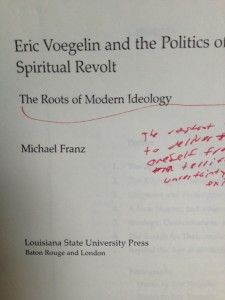Voegelin: An Introduction

I first heard about Voegelin through Russell Kirk's Enemies of the Permanent Things. I bought one of Voegelin's shorter books (The New Science of Politics, I think) and was so confused by it that I called Information/Mecosta, and asked for Russell Kirk's phone number. I called Kirk (brash and inconsiderate of me, I suppose), who came to the phone and obligingly explained to a stranger what Voegelin was trying to accomplish. I was still confused, but Kirk's verbal assistance helped me enough to get through the book and, eventually, much of Voegelin's corpus (including the five volume Order and History, though I barely understood the last volume and didn't understand large parts of the fourth).
If you're not sure whether you're interested in this difficult thinker, here are a few random thoughts about him that might entice you: he identified himself as a "pre-Reformation Christian," though I've never come to grips with what exactly that means. In addition to Kirk, his admirers included the likes of Flannery O'Connor and Marion Montgomery. He hated both the Nazis (the Gestapo investigated him) and the Communists, and he did much to draw parallels between them, liberalism, and ancient Gnosticism. He was perhaps the first person to recognize those schools of thought/ideology for what they are: spiritual diseases.
I've read three Voegelin biographies, plus his Autobiographical Reflections. My favorite, Eric Voegelin and the Politics of Spiritual Revolt by Michael Franz, is out of print. It was out of print twenty years ago. I had to make a copy of it (see iPhone pic above) from the Wayne State University library (a library I frequented as part of my job as a law clerk). You can buy used versions online and, if you're interested in Voegelin's thought, I suggest you do.
But if you don't want to go through that effort, the other two bios I read are also very good: Eric Voegelin, by Michael Federici (ISI Books) and The Voegelinian Revolution by Ellis Sandoz. Of the two, I recall that Federici's is easier to read.
Expect many Voegelin passages in the future. I will try to remember to link back to this intro.
